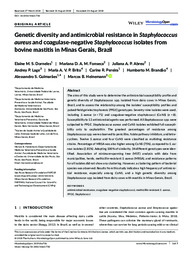Genetic diversity and antimicrobial resistance in Staphylococcus aureus and coagulase-negative Staphylococcus isolates from bovine mastitis in Minas Gerais, Brazil.
Genetic diversity and antimicrobial resistance in Staphylococcus aureus and coagulase-negative Staphylococcus isolates from bovine mastitis in Minas Gerais, Brazil.
Author(s): DORNELES, E. M. S.; FONSECA, M. D. A. M.; ABREU, J. A. P.; LAGE, A. P.; BRITO, M. A. V. P.; PEREIRA, C. R.; BRANDAO, H. de M.; GUIMARÃES, A. S.; HEINEMANN, M. B.
Summary: The aims of this study were to determine the antimicrobial susceptibility profile and genetic diversity of Staphylococcus spp. isolated from dairy cows in Minas Gerais, Brazil, and to assess the relationship among the isolates? susceptibility profiles and pulsed‐field gel electrophoresis (PFGE) genotypes. Seventy‐nine isolates were used, including S. aureus (n = 71) and coagulase‐negative staphylococci (CoNS) (n = 8). Susceptibility to 12 antimicrobial agents was performed. All Staphylococcus spp. were subjected to PFGE. Staphylococcus aureus and CoNS isolates exhibited full susceptibility only to cephalothin. The greatest percentages of resistance among Staphylococcus spp. were observed to penicillins, folate pathway inhibitors, and tetracyclines. Twelve S. aureus and four CoNS were classified as multidrug resistance strains. Percentage of MRSA was also higher among CoNS (75%), compared to S. aureus isolates (2.81%). Adopting 100% of similarity, 34 different genotypes were identified. Association of minimum‐spanning tree (MST) analysis with data from municipalities, herds, methicillin‐resistant S. aureus (MRSA), and resistance patterns for all isolates did not show any clustering. However, a clustering pattern of bacterial species was observed. Results from this study indicate a high frequency of antimicrobial resistance, especially among CoNS, and a high genetic diversity among Staphylococcus spp. isolated from dairy cows with mastitis in Minas Gerais, Brazil.
Publication year: 2019
Types of publication: Journal article
Unit: Embrapa Dairy Cattle
Observation
Some of Embrapa's publications are published as ePub files. To read them, use or download one of the following free software options to your computer or mobile device. Android: Google Play Books; IOS: iBooks; Windows and Linux: Calibre.
Access other publications
Access the Agricultural Research Database (BDPA) to consult Embrapa's full library collection and records.
Visit Embrapa Bookstore to purchase books and other publications sold by Embrapa.

